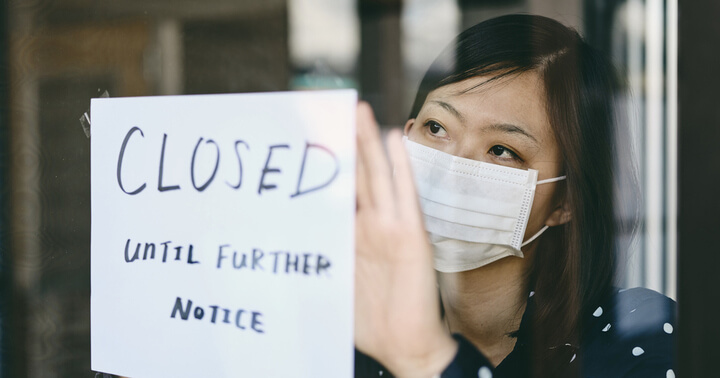The recession that we are experiencing in Singapore is a peculiar one because it is a recession induced by safety measures implemented to curb the spread of a disease. The good news? We have been able to contain the widespread community transmission of COVID-19 with the Circuit Breaker and safe distancing measures. The bad news? Many people are affected by the recession. Let’s look at ways to prepare for what’s coming and how to survive this recession.
What are the main effects of the recession?
1. Unemployment
Unemployment rate in Singapore is reported to be at its highest in 10 years, rising to 3.4% from 2.4% just last year. This is no surprise as businesses were forced to close temporarily during the Circuit Breaker period. Retrenchment numbers are expected to rise even further.
2. Lesser income
Those who are still able to hold on to their jobs may experience a pay cut as companies need to cut down on budget. Those who were expecting a raise or bonus may not be able to get it anytime soon.
3. Greater job competitions
Certain sectors are actively hiring with at least 33,000 job vacancies in Singapore as of May 2020. These sectors include healthcare, education, finance and IT to name a few. The government is also rolling out job support programmes which promises to create 100,000 new jobs. However, as retrenchment and unemployment are on the rise, job seekers can expect a very competitive job market for the time being.
4. Less shopping
Not everyone can have the luxury of shopping at the moment. Not to mention, as more shops are closed down, people will resort to buying things online at a cheaper price. It is also a good idea not to splurge and be more mindful of your spending during this period.
5. Less traveling
Tourism industry starts up, country borders open and airplanes are lifting off again. However, there are also spikes in ticket prices due to the pandemic. Even though anyone can travel if they wish to, they still face the risk of infection, especially in more crowded places.
6. Stress, anxiety and depression
Samaritans of Singapore (SOS) reported a 22% increase in calls for their helpline since Circuit Breaker as more people are calling for help. Such trends may continue as people struggle to get by due to the recession. If you’re feeling overwhelmed, do seek help. Visit this page for official resources to deal with depression and anxiety.
Who will be affected and how?
1. Professionals
Professional adults face the risk of retrenchment or pay cut. Vacancies are also scarce in an already crowded job market. And those who remain employed may not get a raise or promotion anytime soon.
2. Elderly
For the elderly, their retirement funds may be affected by the recession and their children may not be able to give them monthly allowances as before. Retirees may also be forced to return to the workforce in order to find income.
3. Students
Younger students may get less allowance from their parents as parents have to cut down on spending. Graduating students may face the challenge of unemployment and a bad job market due to the reasons discussed above.
How to survive the recession?
1. Plan your monthly budget
Consider dividing your monthly budget using the 50-30-20 rule. That means:
- 50% for your needs, such as food, water and electricity,
- 30% for your wants, such as leisure and entertainment, and
- 20% for your savings.
Read more about managing your finances during the recession here.
2. Consider savings plans and investments
If you have been thinking about growing your savings and making an investment, now may be the best chance to start making your money work for you. Learn more about savings and investments before making your next move.
#TiqOurWord Savings instruments with greater flexibility can give you better access to cash in times of needs. With ELASTIQ flexible whole life insurance savings plan, you can enjoy guaranteed high crediting rates of 1.80% p.a. for the first 3 years. Plus, enjoy the flexibility to top-up and withdraw anytime you want. Check out other insurance savings plans here.
3. Review life insurance
Life insurance may seem like an additional cost that you do not need, especially during a recession. If you are thinking about cancelling your life insurance, wait! Instead of doing that, you may want to review your current policy to ensure that it is offering you what you need and still affordable in your current situation.
#TiqOurWord Etiqa Insurance offers the Deferred Premium Payment Arrangement (DPPA) to ease any financial burden that life policyholders may be experiencing due to the coronavirus pandemic. All life policyholders also get up to S$52,000 additional coverage with the Financial Assistance Benefits for COVID-19. Learn more here.
4. Go part-time or be a freelancer
Consider part-time or freelance jobs in order to support yourself financially. A more flexible job option may also be a great opportunity for you to spend more time with your family or start your own business.
5. Obtain new skills to explore new careers
Chin up, learn new skills and explore in-demand careers such digital marketing, graphic design and web development. Check out these online learning resources to improve your knowledge and skills.
Never give up
Everyone is feeling the stress, but some more than others. As we are battling both an economic recession and an ongoing global pandemic, it is in everyone’s best interest to stay healthy, practise safety measures and never give up. Know that your existence matter and this too shall pass.
[End]
Information is accurate as of 5 August 2020. This policy is underwritten by Etiqa Insurance Pte. Ltd. (Company Reg. No. 201331905K). Protected up to specified limits by SDIC. As buying a life insurance policy is a long-term commitment, an early termination of the policy usually involves high costs and the surrender value, if any, that is payable to you may be zero or less than the total premiums paid. You should seek advice from a financial adviser before deciding to purchase the policy. If you choose not to seek advice, you should consider if the policy is suitable for you. This advertisement has not been reviewed by the Monetary Authority of Singapore.
Tiq by Etiqa Insurance Pte. Ltd.
A digital insurance channel that embraces changes to provide simple and convenient protection, Tiq’s mission is to make insurance transparent and accessible, inspiring you today to be prepared for life’s surprises and inevitabilities, while empowering you to “Live Unlimited” and take control of your tomorrow.
With a shared vision to change the paradigm of insurance and reshape customer experience, Etiqa created the strong foundation for Tiq. Because life never stops changing, Etiqa never stops progressing. A licensed life and general insurance company registered in the Republic of Singapore and regulated by the Monetary Authority of Singapore, Etiqa is governed by the Insurance Act and has been providing insurance solutions since 1961. It is 69% owned by Maybank, Southeast Asia’s fourth largest banking group, with more than 22 million customers in 20 countries; and 31% owned by Ageas, an international insurance group with 33 million customers across 16 countries.
Discover the full range of Tiq online insurance plans here.










